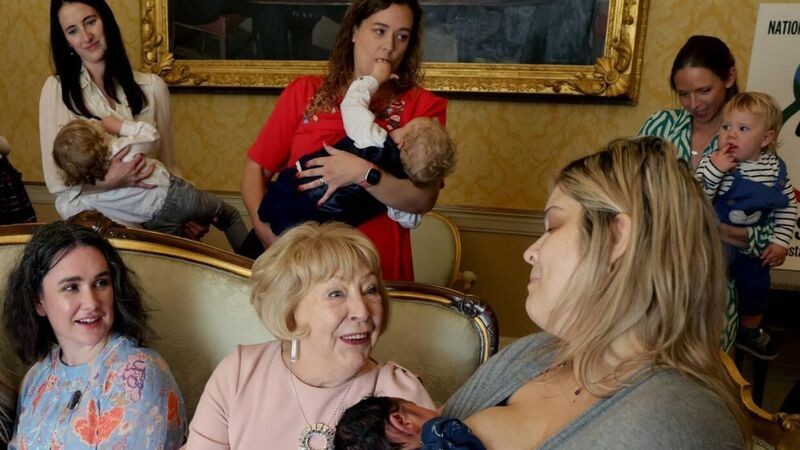Breast is best, but mums need to milk all the help out there

Beyond that, I didn’t really give much thought.
I intended to breastfeed because I knew my body was designed to do so, my family and friends had breastfed and human milk for human babies makes sense, but I was completely ignorant to the practicalities of how breastfeeding worked or what would be involved.
The early attempts to get my baby to latch and feed from the breast were stressful, hands-on affairs involving an open-mouthed screaming newborn, nipple shields, syringes filled with my milk, and the hands of a patient midwife getting my breast and baby aligned.
It was stressful and I joked it would be a long time before I was breastfeeding in public, but the midwife Joan reassured me that baby and I would soon find our way.
It wasn’t plain sailing once we got home, but after a less than ideal start, I was determined to make breastfeeding work and vowed to breastfeed him until he could run away from me!
It’s National Breastfeeding Week and the theme for this year is ‘Expert Help for Every Step of the Way’. I certainly milked every bit of help I could as I tried to get to grips with an unsettled baby who wasn’t gaining weight sufficiently.
I plagued my public health nurse, GP and community midwife with phone calls and questions, but it was a La Leche League breastfeeding supporter who suggested I get a second opinion about whether my baby had a tongue tie that changed the course of our journey.
Lo and behold, he did. Two snips later and a visit from a private lactation consultant and things were more manageable.
Thankfully, I had the means to pay for his tongue tie to be corrected and for a lactation consultant to come to our house, but so many mothers who wish to breastfeed simply don’t have the means to pay for those interventions.
At six months of age, fewer than 6% of infants in Ireland are exclusively breastfed compared to a global average of 40% and a European average of 25%.
The World Health Organisation (WHO) recommends that all infants should be exclusively breastfed until six months of age and continue breastfeeding with the introduction of solid foods until two years or beyond.
It saddens me to think of all the mothers who want to breastfeed but don’t get the right support at the right time.
When pregnant with my second child, I decided to give something back for all the breastfeeding support I had received, and I trained as a breastfeeding counsellor with the parent support organisation, Cuidiú.
There are 180 volunteer breastfeeding counsellors with Cuidiú around the country who offer peer support on the phone, at in-person coffee mornings and on Zoom.
Other fantastic organisations such as Friends of Breastfeeding and La Leche League offer similar support in communities.
The HSE has improved support for breastfeeding with the recruitment of more infant feeding and lactation personnel, and specialist lactation support in all 19 maternity hospitals, as well as the ‘ask the breastfeeding expert’ on the mychild.ie website.
However, listening to mothers and midwives, what seems to be most needed is more postnatal staff to give women the time they deserve to establish breastfeeding successfully.
Our overstretched and understaffed health system is not conducive to helping build the vision for the National Breastfeeding Action Plan of “a society where breastfeeding is the norm for individuals, families and communities in Ireland, resulting in improved child and maternal health outcomes, where all women receive the support that they need to enable them to breastfeed for longer”.
Mrs Sabina Higgins aspires to that vision, which is why she has made her annual ‘Latching On’ event for National Breastfeeding Week one of her most important Áras an Uachtaráin initiatives, and it is a meaningful acknowledgement of the wonderful organisations and people that are advocating and assisting to get breastfeeding more established in Ireland.
Over the cacophony of a room full of babies, President Higgins said: “The building will reverberate for a long time with all the life that is in this room and you’re all most welcome.”
The tea from the harp-emblazoned teacup was extra lovely and the refreshments were extra delicious, but what was really special about the event was the public recognition by Mrs Higgins and the office of the President that breastfeeding is important for health, social justice and sustainability, and that families need and deserve better support from the health service, in tandem with greater protection from the marketing of the baby food industry, which strives to undermine breastfeeding and influence infant feeding choices.
Regardless of how a family chooses to feed their baby, they should feel supported and minded. We can all help with that.
If you know a new mother, drop off a dinner and tell them they are doing a great job.
To celebrate National Breastfeeding Week, if you see a woman breastfeeding, give her the thumbs and an encouraging smile.
Sometimes a kind word on a tough day can make a world of difference.







 App?
App?




